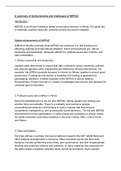A summary of Achievements and challenges of NEPAD
Introduction
NEPAD is an African institution aimed at economic recovery in Africa. The goals are
to eradicate: political insecurity, extreme poverty and social instability.
Salient achievements of NEPAD
Difficult to identify precisely what NEPAD has achieved, it is still growing and
attracting regional and international attention. Some achievements are: African
ownership and leadership, adequate attention to political issues and conflicts, and
debt cancellation.
1. African ownership and leadership
Leaders were determined to ensure that their continent’s social, economic, political,
and security agendas were championed and defined by Africans themselves. For
example, the APRM succeeds because it’s driven by African leaders to ensure good
governance. Funding for this activity is essential; the funding is generated by
participating members. Another example is the NEPAD e-school Initiative
Demonstration Project that aims to create a knowledge base society and address the
universal goal of education.
2. Political issues and conflicts in Africa
Since the establishment of the AU and NEPAD, African leaders are holding one
another more accountable. There is a solidarity and resolve to oppose
unconstitutional behaviour and behave in such a manner that that ensures
competence, transparency, and procedurally sound decisions. The AU and NEPAD
are prominent in their participation in conflict areas and contribute to African troops
for conflict resolution and peace building in: Burundi, Liberia, DRC, Cote D’Ivoire,
and Sudan.
3. Debt cancellation
For many African countries, the level of debt and owed to the IMF, World Bank and
other bilateral arrangements is immense. Often countries cannot pay their debt
because of poorly performing economies, poor governance, and lack of appropriate
financial and economic policies and practices. In many instances the repayment of
the debt creates a situation whereby funds cannot be diverted to much needed





